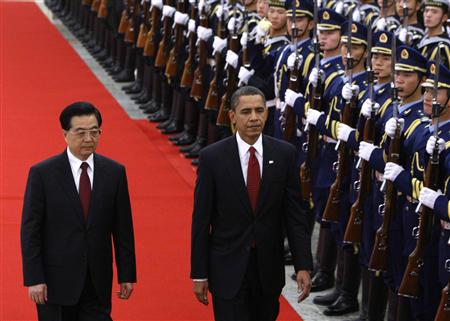
Presidents Hu and Obama in Beijing Tuesday. Source: www.lepoint.fr
Presidents Hu and Obama finished their summit in Beijing and issued a joint statement. Below, Christiaan Tuntono of CSFB notes that President Obama didn’t get a commitment from China to revalue the RMB against the U.S. dollar, which would effectively increase Chinese demand for U.S. exports. As RMB undervaluation is a key focus of such Congressional China-bashers as Senator Chuck Schumer, President Obama may return home perceived as being soft on China.
As caretakers of not only the planet’s most populous nation (and third largest economy), but also of a 5000-year old civilization, China’s leaders study history. Not that they always learn the right lessons. What they learned from the Asian financial crisis of the late 90’s was that a country must hold a fortress of foreign exchange reserves, so as not to be at the mercy of international capital. The likes of Korea, Thailand and Indonesia were made to grovel at the feet of the IMF because they ran out of fx reserves.
Likewise, Tuntono suggests that what China learned from 1985 Plaza Accord on exchange rates was not to give in to pressure to revalue your currency. At that time, the U.S. economy was floundering in part due to a strong U.S. dollar. So, Japan agreed to bolster the yen, allowing a depreciation of the dollar, in order to reduce the U.S. trade deficit and jumpstart the U.S. economy. Consequently, recessionary conditions in Japan led to a loose monetary policy, sparking Japan’s asset price bubble and ultimately a decade of stagnation. China hopes to avoid the same by resisting calls to strengthen the RMB. With so many U.S. treasuries in the bank, China is in a good position to just say no.
From CSFB November 19, 2009:
Christiaan Tuntono
+852 2101 7409
[email protected]
The China-US joint statement mentioned neither the RMB exchange rate nor China’s commitment to purchase US Treasury securities, suggesting that the two sides may not have reached consensus on these contentious issues. US President Obama concluded his visit to China on 18 November and released a joint statement with China President Hu Jintao the day before to highlight the consensus reached during this visit. The statement under the “economic cooperation and global recovery” section seems to be in line with the existing economic policies pursued by the two sides, but the lack of mention of the RMB exchange rate seems to suggest that the two sides continue to disagree on this issue. Under the economic section, China promises continued adjustment on economic structure and to raise the contribution of domestic demand to its growth. The US pledges it will increase national saving, promote non-inflationary growth, and return the federal budget to a sustainable level. In our view, the promises suggest that China will gradually decrease its reliance on exports, while the US will protect the safety of China’s investments. The lack of reference to the RMB, despite what was widely considered to be the focus of this meeting, reflected China’s refusal to identify it as the tool to rebalance its economic structure. The Chinese also refrained from making any statement to suggest its support for US Treasury securities, as it would like to see how the US manages its fiscal account and inflation, in our view.
We think the statement is positive for China, but Obama may face pressure back home from critics accusing him of being soft on China. We think Obama may face criticism from the conservative wing in Congress and the general public for sidelining the issue of the RMB exchange rate in the joint statement. In our view, the US may have a higher priority now in cementing China’s support for US Treasury debt, and is in a weak position to push on the exchange rate front. We believe China will appreciate the RMB at its own pace and do not anticipate major move in the near term. The recent statement in the PBoC’s 3Q09 monetary policy report already revealed Beijing’s changed attitude in benchmarking the RMB more against other global cross rates, which may achieve a better balance against the EUR and JPY as the USD weakens. With the memory of the 1985 Plaza Accord and its impact on the Japanese economy in mind, we believe China’s policymakers would opt to boost private consumption and domestic demand as the means for global rebalancing, rather than a sharp rise in the RMB. We also think that this could be a better solution for the rest of the world.